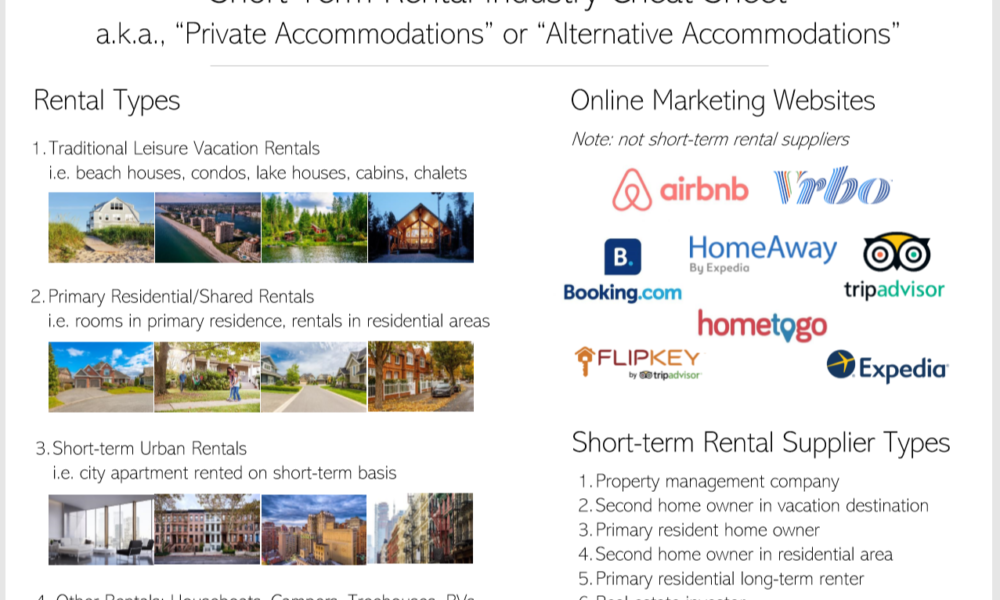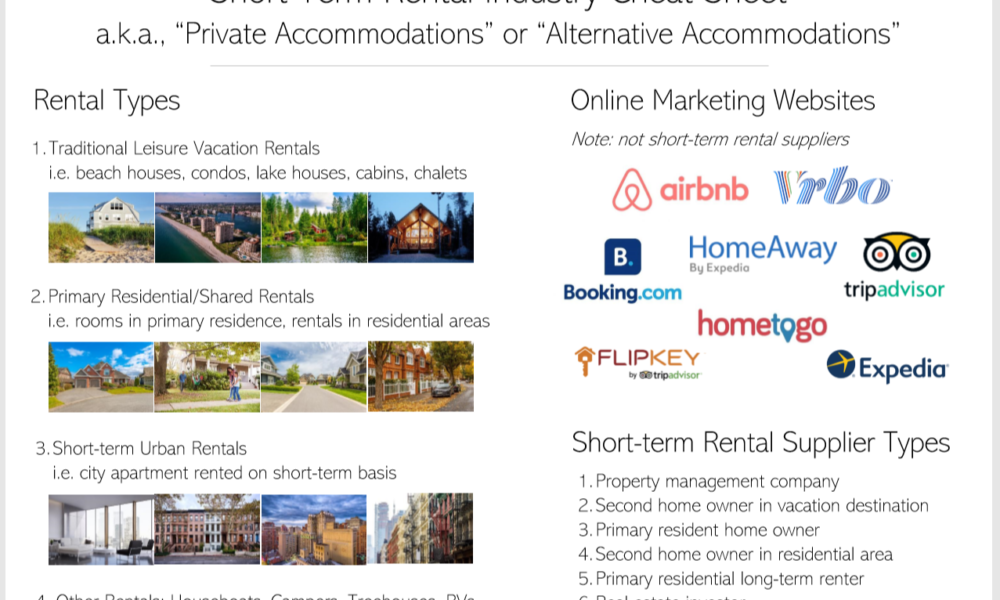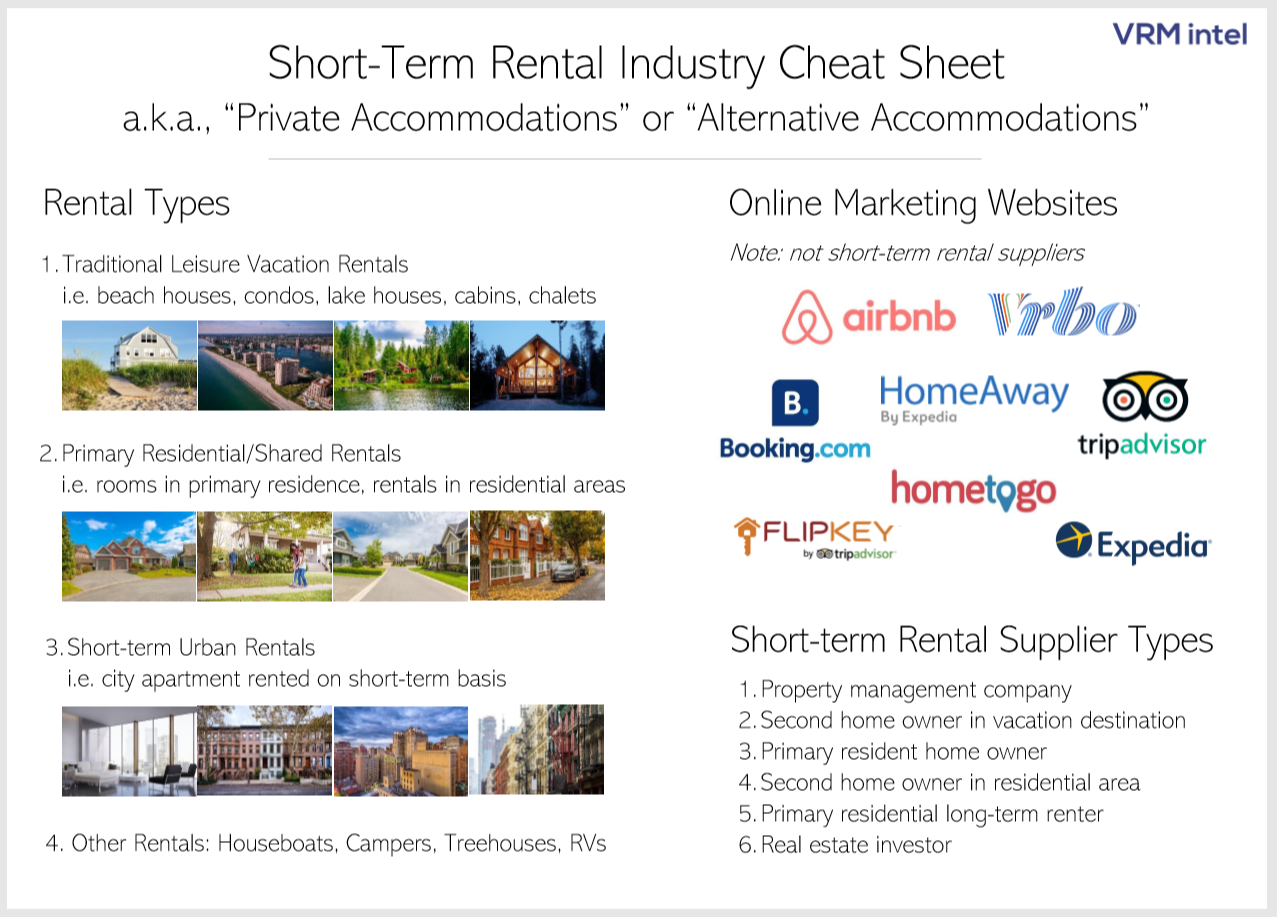A Basic Primer on Short-term Rentals with a Cheat Sheet and Checklist of Considerations for City Officials
Charles Payne August 29, 2019 0An increasing number of municipalities are looking for the best way to regulate short-term rental regulations, and elected officials are understandably…


An increasing number of municipalities are looking for the best way to regulate short-term rental regulations, and elected officials are understandably confused about how to work with short-term rentals in their communities.
While we wish it was possible, there is not a one-size-fits-all strategy for regulating rental activity. Each state, region, destination, municipality, and neighborhood faces its own unique challenges and has varying resident sentiment about short-term rentals.
Noise, parking, trash, taxes, and affordable housing top the list of concerns resulting from short-term rental activity. However, the first challenge city officials encounter is simply understanding the broad scope short-term rental industry. For city council members—or anyone looking to have a discussion about the short-term rental industry—here is a simplified breakdown of the industry with definitions and a basic background of rental types that have found themselves lumped into the short-term rental category, along with a checklist of considerations for city officials.
Short-term rentals, private accommodations, alternative accommodations, Airbnbs . . . What are they?
The short-term rental industry is a broad heading for a multitude of non-hotel lodging options.
Generally, there are four types of rentals that fall under the short-term rental umbrella:
- Traditional leisure vacation rentals
- Short-term urban rentals
- Primary residential and shared home rentals
- Other: houseboats, campers, tree houses, RVs, etc.
But first, as city officials, you are not regulating “Airbnbs”
Airbnb is a company, not a type. Airbnb is a website that lists short-term rentals—and now hotels. But the company is a marketing site, not a rental provider . . . yet.
We get it. We all “Uber” instead of “ride share” when we actually might be using Lyft—in the same way that we reach for a Kleenex, bandage a cut with a Band-Aid, and make notes on Post-Its using Sharpies.
Calling a short-term rental “an Airbnb” helps consumers simplify the activity in conversation, as the user doesn’t have to explain if it is an apartment, a house, a guest room, a condo, or a camper. And for some travelers, it just sounds cooler.
However, for city officials and regulators, labeling the entire short-term rental industry as “Airbnbs” is dangerously inaccurate.
Without getting too deep into the “other” category (houseboats, campers, tree houses, RVs), here is a better explanation of the top three types of short-term rentals:
1. Traditional Leisure Vacation Rentals
Rental Types: Whole-home lodging options in tourist areas, such as beach houses, condos, cabins, chalets, condo-hotels located in leisure—and often seasonal—destinations
Suppliers: Traditional leisure vacation rentals are typically individually-owned vacation homes (a.k.a., second homes), and are either professionally managed (rented through a property management company) or owner managed (rented directly from the second home owner). Traditional vacation rentals are rented on a short-term basis in destinations that attract leisure travelers (i.e., beaches, mountains, lakes, or near national parks/theme parks).
Background: In Europe, these vacation (or “holiday”) home rentals have been popular for centuries. In the US, vacation rentals date back over 100 years and became popular in vacation markets 1) in which families look for multi-bedroom lodging options, and 2) in seasonal markets where hotels could not achieve the 65% occupancy requirements needed to be profitable.
Vacation rentals provide whole-home lodging options with kitchens, separate living areas, and washers/dryers for families and groups in vacation areas. In traditional vacation rental destinations, vacation rentals are more popular than hotels—as there are not enough hotels to accommodate seasonal travelers visiting the area; and hotels require occupancy for over two-thirds of the year in order to meet profitability margin requirements. In many of these markets, vacation rentals are the largest driver of revenue and jobs, and the vacation rental industry enables these destinations to support a year-round population.
Looking at the downside—with the transient nature of seasonal destinations—condominium complexes and developments have “busy seasons” that can make it annoying for long-term residents to deal with the large number of travelers during peak seasons. However, in these seasonal markets, there likely was never a reasonable expectation that tourism would cease.
NIMBY (not in my backyard): In traditional vacation rental markets, vacation home guests become vacation home owners. In some cases, these new owners want to shut the door behind them. For example, a couple will vacation in a destination for years and then decide to buy a second home in which they intend to retire. Once they retire and move to the destination, they no longer want tourism there and begin to complain to city officials about tourism activity. As this homeowner is now a resident—who votes—this dynamic puts pressure on elected city officials.
2. Short-Term Urban Rentals
Rental Types: Apartment-style short-term rentals in cities (i.e. New York, San Francisco, Seattle, Miami, Chicago, etc.)
Suppliers: Often rented under long-term leases by management companies, these apartment-style rentals are subleased as short-term rentals and booked via online marketplaces, such as Airbnb, Booking.com, and Expedia. In many cases, a group of apartments or even an entire apartment building is leased by a management company and subsequently designed, marketed, and operated as a short-term rental operation. When you hear the term “illegal hotel,” these short-term urban apartment-style rentals are what people are referring to.
Background: Short-term urban rentals became popular as a direct result of Airbnb. Airbnb provided an online marketplace for these lodging options, and they initially became popular among millennials who wanted to “live like a local” in city centers. However, in recent years, short-term urban rentals have become mainstream among business travelers and guests who seek apartment-type lodging with kitchens, separate living areas, and washers/dryers.
Disadvantage: These short-term urban rentals are often in buildings that might otherwise have been available to long-term renters. Some residents and city planners claim that the existence of these short-term urban rentals contributes to housing shortages in popular downtown areas.
3. Primary Residential and Shared Short-term Rentals
Rental Types: Short-term rentals in residential areas; short-term rentals that are primary residences; room rentals (extra bedrooms/guest houses) in which the primary resident is present; and homes that are available for rent during special events (sporting events, music festivals, political conventions, etc.), These rentals could be anywhere, and as a result of the Airbnb marketplace, they have sprouted all over the world.
Suppliers: These rentals are supplied by hosts, a term coined by Airbnb instead of homeowner because a significant number of these residential rental providers are not homeowners, but are actually long-term renters themselves. The rental provider could be a long-term renter or a homeowner. In many cases, the host rents out part of the home as a rental or moves out of the home during the rental period. These rentals generally are not second home rentals; they are primary residences available—in part or in whole—based on demand.
Background: Like short-term urban apartment-style rentals, residential short-term rentals are relatively new lodging options made possible by Airbnb. Airbnb created a marketplace for primary residents to supplement their income by renting out their homes on a short-term basis, and these residential short-term rentals are now available anywhere and everywhere.
Advantages: Gives consumers affordable lodging options, lets travelers experience a town “like a local,” and opens up primary residences as lodging alternatives during peak periods (i.e. music festivals, sporting events, or political conventions) or for specialized lodging needs (i.e. weddings, graduations, funerals, etc.).
Disadvantages: Brings short-term rental guests into residential areas not accustomed to the in-and-out activity of rental guests. Criticisms also include noise, trash, and parking complaints from neighbors. However, the complaints often stem from neighbors who do not like having a stream of short-term visitors in their residential sphere.
Before You Regulate: Checklist for City Officials before passing new short-term rental regulations
Making the decision to create and enforce new regulations and requirements is a difficult undertaking and one that can have far-reaching consequences. We’ve seen a number of legal challenges, lawsuits against cities, and statewide legislation overriding municipal regulations that legislators deem harmful to the state’s overall economy.
Here is a checklist for city officials as they consider regulations:
1. All short-term rental activity is not the same. What kind of rental activity do you have in your municipality? How many units/homes/properties by rental type are in your city?
- Traditional vacation rentals (second homes/vacation homes in tourist areas)
- Short-term urban apartment rentals
- Primary residential and/or shared rentals (rentals in residential areas)
2. If there are complaints from residents, which type of short-term rental is causing the most issues or complaints? And what types of complaints are you receiving? How many?
![]()
3. Can any of the identified problems be resolved by working directly with Home Owners Associations (HOAs), Condo Owners Associations (COAs), or Property Owner Associations (POAs) without writing new legislation?
In many municipalities, complaints are isolated to handful of residential neighborhoods and/or subdivisions. If officials can resolve issues and complaints by working hand-in-hand with HOAs, COAs, or POAs, it will save an enormous amount of hardship down the road.
4. If facing complaints from constituents, how many formal complaints are there? Have you engaged the police department in identifying responses to complaints about short-term renters vs long-term renters?
Having actionable data from the police department has been helpful for other city officials in examining regulations and in talking to residents about the actual vs perceived issues. In addition, documenting police responses to activity that results from short-term renters vs responses to activity that results from long-term renters can shed some light into where problems are actually occurring.
5. What is the economic impact to the municipality from rental activity (lodging tax revenue, rental and restaurant activity, attractions, direct jobs, related service jobs (home service providers, landscapers, Realtors, professional services)?
If the economic impact from rental activity in your city has not been measured, this is the most responsible place to start. Regulating activity without understanding the adverse consequences has put more than one city council in a difficult position that resulted in legal challenges, lawsuits, and involvement on the state level. Studies can be commissioned using companies such as Smart City Policy Group.
6. Has your city tried implementing solutions that do not overly regulate businesses? Are you enforcing laws already on the books?
For example, when addressing noise complaints, requiring local 24/7-on-call staff/contacts for rentals or implementing noise monitoring systems could solve most issues. For parking, increasing parking ticket fines from $38 to $200 can offer a huge incentive for owners and rental management companies to notify guests of penalties. Have you required that property management companies and owners post and have guests sign off on “good neighbor” requirements in rental contracts? While trying to find a quick fix may seem attractive, exploring some business-friendly solutions can help your city avoid in costly legal challenges.
7. Examine your city planning strategy.
If the problem is with traditional vacation rentals, the culprit may not be the vacation rentals themselves, but the city’s development strategy. If the city is seeking to limit rental activity while simultaneously passing out new building permits like Halloween candy to developers, the current nuisances likely will not be solved by passing more rental regulations.
Just another note about Airbnb, Vrbo, and other websites
Websites like Airbnb, Vrbo, Booking.com, TripAdvisor, HomeAway, etc. are online aggregators who only list short-term rentals for consumers (like Zillow in the real estate sector). They do not currently manage these rentals. These websites operate largely on a commission model which “takes” a percentage of the booking total. This percentage is referred to as their “take rate,” and is now totaling between 10 to 20 percent depending on the website and agreement with the supplier (management company, homeowner, primary renter, host).
Example: Mary is planning a beach vacation for her family. She searches on Airbnb and Vrbo to find a condo to rent. She books the condo on Airbnb, pays on Airbnb, but the reservation is actually passed to XYZ Vacation Rentals who manages the home for a John and Ann, who live in Atlanta and who bought the condo as a vacation spot for their families. If there are noise or parking issues, Airbnb will not be the one to respond to a call from the city. Airbnb, Vrbo, Booking.com, TripAdvisor, HomeAway, etc. do not own or manage the condo. They are simply websites that list available rentals.
Note: Airbnb has made several acquisitions indicating a couple of moves into managing short-term rentals. However, Airbnb is still primarily an online marketplace. When city officials attempt to regulate “Airbnbs,” it is important to know that Airbnb is not the provider of the rental, they simply advertise and facilitate the transaction.
When Airbnb lobbies city officials to influence regulatory activity, city officials will find it useful to recognize that Airbnb’s primary goal is legalizing its core business, and in many areas that translates to working to promote the short-term urban rental and the primary/shared residential rental types. Discerning these sites’ motivations will help in weeding out potential conflicts of interests.





